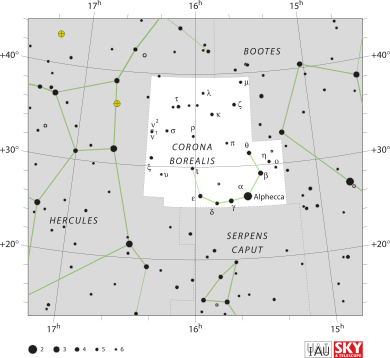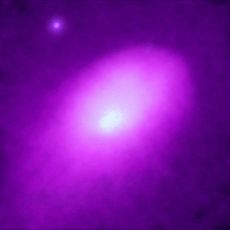Corona Borealis facts for kids
| Constellation | |

List of stars in Corona Borealis
|
|
| Abbreviation | CrB |
|---|---|
| Genitive | Coronae Borealis |
| Pronunciation | genitive |
| Symbolism | The Northern Crown |
| Right ascension | 15h 16m 03.8205s–16h 25m 07.1526s |
| Declination | 39.7117195°–25.5380573° |
| Area | 179 sq. deg. (73rd) |
| Main stars | 8 |
| Bayer/Flamsteed stars |
24 |
| Stars with planets | 4 |
| Stars brighter than 3.00m | 4 |
| Stars within 10.00 pc (32.62 ly) | 0 |
| Brightest star | α CrB (Alphecca or Gemma) (2.21m) |
| Messier objects | 0 |
| Meteor showers | None |
| Bordering constellations |
|
| Visible at latitudes between +90° and −50°. Best visible at 21:00 (9 p.m.) during the month of July. |
|
Corona Borealis is a small group of stars, called a constellation, found in the northern part of the sky. Its brightest stars form a shape like a half-circle or a crown. It's one of the 88 constellations we know today. An ancient astronomer named Ptolemy first listed it as "Corona" (meaning "Crown"). Later, "Borealis" (meaning "northern") was added to tell it apart from Corona Australis, the "Southern Crown."
Stars in Corona Borealis

Corona Borealis does not have any super bright stars. Its brightest star is named Alphecca. You might also hear it called Gemma. Alphecca shines with a brightness of 2.2. It is a slightly variable star, which means its brightness changes a little over time. Alphecca is also part of a group of stars known as the Ursa Major Moving Group.
This constellation also has some other interesting variable stars. Two of the most famous are R Coronae Borealis and T Coronae Borealis.
Deep Sky Objects
Corona Borealis does not have many bright objects that are far away in space. One interesting object is Abell 2065. This is a huge group of over 400 galaxies packed closely together. The brightest galaxies in this cluster are about 16th magnitude. This means they are very dim and hard to see without a powerful telescope.
Myths and Stories
Many cultures have told stories about the stars in Corona Borealis.
- Sometimes, people thought it looked like a crown given by the god Dionysus to Ariadne. She was the daughter of Minos, a king from Crete.
- Other times, it was seen as belonging to Boötes, the herdsman. He was often thought of as the keeper of the bears in the sky.
- The Cheyenne tribe, a Native American group, called this constellation "Camp Circle." They arranged their camps in a semicircle, just like the shape of these stars.
Images for kids
-
Hercules and Corona Borealis, as depicted in Urania's Mirror (c. 1825)
See also
 In Spanish: Corona Borealis para niños
In Spanish: Corona Borealis para niños
 | Laphonza Butler |
 | Daisy Bates |
 | Elizabeth Piper Ensley |


